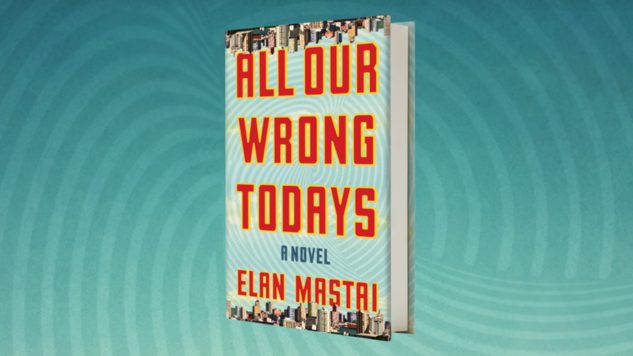Our World Is the Dystopia: Elan Mastai Talks Time Travel and Alternate Realities in All Our Wrong Todays
Books Features Elan Mastai
When screenwriter Elan Mastai first imagined a tale with time travel and alternate realities, he knew it needed to be written as a novel. The book, titled All Our Wrong Todays, earned him a seven-figure deal from Dutton—and then another screenplay contract from Paramount. So Mastai is currently adapting his text for the screen while writing his next novel. In other words, he’s comfortable slipping between two similar but very different worlds.
This helps explain why Mastai wrote All Our Wrong Todays. The book is the first-person confessional of Tom Barren, a man who lives in an alternate present where crime, war, poverty and even rotten avocados don’t exist. But when Tom time travels to 1965, he accidentally reinvents history and sets the messy timeline we recognize in motion.
When Tom returns to our own miserable present, he exists as John, a superstar architect. Tom’s reeling, in part from what he has done to his family and everyone in his world and in part from complete and utter culture shock. (On the bright side, there’s punk rock and hip-hop; on the downside, it’s harder to make good guacamole.) Amazingly, Mastai makes perfect sense of this confusion.
All Our Wrong Todays takes us on Tom’s journey from a selfish man-child to a hero torn between two worlds, highlighting the consequences of action and inaction. And though it was written before President Trump, it proves timely for people who feel they are living in an alternate reality now.
Mastai was narrating the audiobook during election week, and he entered the studio “feeling like [his] character.”
“I had woken up in a world I didn’t expect where I didn’t understand the rules,” he says in an interview with Paste. “I was reading [the book] saying, ‘Oh my god, this sentence has a lot to say about our new situation.’”
Mastai, a rapid-fire talker with a quick smile and easy-going charm, has possessed the ability to see different worlds since childhood. He was born in Vancouver and lives in Toronto, but his mother was American and his father had lived in Morocco, France and Israel by age 10. Much of his own life ended up in the novel; some of it’s clear—Tom’s mother dies, and Mastai’s mother died when he was 26—but some autobiographical touches are “so veiled even the people involved won’t recognize themselves.”
“Writing the novel changed my perspective about reading fiction,” Mastai says. “I used to assume everything was fiction except for the few things in a book that had the texture of the real thing—that something indefinable that pops out. But having written my own novel, I’m hyper-aware of how different it really is…I think what makes my book work is the intersection of the personal and the total invention.”
One total invention that was also personal is Greta, John’s sister. Tom didn’t have a sister in his reality, so he’s stunned when he first encounters her. Mastai was stunned as well; he had plotted out the entire story to make sure the alternate realities lined up in ways that made sense. Greta wasn’t part of that.
“She just appeared,” Mastai says, “but I have sisters, and sisters will call you out on things. And Tom needed that but didn’t know it.”
Greta grounds Tom in our world and raises the stakes on his attempt to return to his reality, which would annihilate our own. “I realized it would not just be a shocking plot twist for Tom but an emotional shock,” Mastai says. “His world had no war, famine or poverty, but would he be willing to trade his own sister for that?”
In addition to grappling with the idea that he must annihilate one world or the other, Tom learns that there are more alternate realities with dark, violent versions of himself. While much of the book has a light comedic touch, Tom’s search for his true identity takes the reader down a grim path.
“I wanted an elastic tone so that I could keep pushing into areas I found raw and interesting,” Mastai says. “I want the book to be entertaining, but the stakes have to be real and the consequences have to hurt or you don’t care. I like the idea that it’s not just the plot twists that turn out to be surprising for the reader but also the emotional twists.”
While he didn’t write this book just to get a movie made, Mastai’s confident he’ll unlock the key to creating a successful adaptation of his novel.
“I didn’t want to do it as a screenplay initially, because the story is so expansive and emotionally nuanced. The cost of executing it would have led to them making it just a techno-thriller or a fish-out-of-water comedy,” says Mastai, whose previous screenplays include What If starring Daniel Radcliffe and Zoe Kazan and The Good Samaritan starring Samuel L. Jackson, Ruth Negga and Tom Wilkinson. But Mastai believes his experience will allow him to capture the novel’s spirit without religiously adhering to the text.
As far as fiction goes, Mastai is midway through his next novel, again slipping between similar but different worlds. “It has a different story and a different literary approach,” he says. “But if you like All Our Wrong Todays, you’ll like this book.”